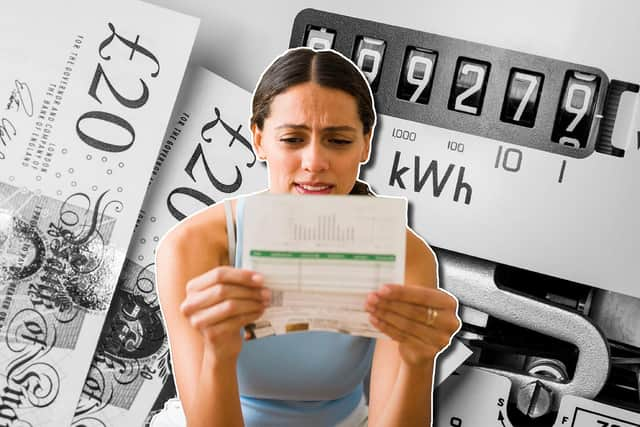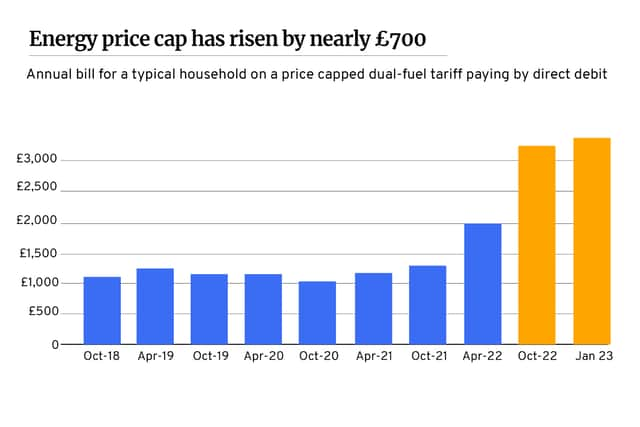Cost of living crisis: Charities warn people are turning to “desperate methods” to save on energy bills
and live on Freeview channel 276
Poverty charities have warned that people are already turning to “desperate methods” to save money on energy bills, fearing many will be plunged into crisis this winter.
Charities have called for urgent Government intervention after analysts Cornwall Insight made a dire prediction that bills will hit a staggering £3,359 per year from October for the average household, and not fall below that level until at least the end of next year.
Advertisement
Hide AdAdvertisement
Hide AdThe analysis came on the same day that energy giant BP reported its biggest quarterly profit for 14 years.
Peter Smith, director of policy and advocacy at National Energy Action, said the charity was preparing for a “hellish winter”.


He said: “Energy prices are already at a record level, so it’s hugely worrying that bills are going to exceed earlier expectations.”
National Energy Action predicted last month that, should the average bill reach £3,250 per year, 8.2 million UK households will be in fuel poverty.
This equates to 1 in 3 households.
Advertisement
Hide AdAdvertisement
Hide AdMr Smith said the charity was already seeing households using “a range of desperate methods” to reduce energy consumption in their homes.
These include avoiding heating homes entirely, going to bed early, spending time in libraries or cafes to use free electricity and heating, cutting back on food shops, and only eating cold meals.
He explained: “These are typically things we see in winter months amongst more vulnerable households, and they are relatively rare.
“But with the rate at which prices are increasing, we’re concerned these will become mainstream prices for more and more of the population.”
Advertisement
Hide AdAdvertisement
Hide AdWhen asked about profits of energy companies such as BP, Mr Smith commented: “Members of the public will be annoyed, frustrated and alarmed.
“While it’s hugely important that oil and gas companies recognise the legitimate concerns about profit margins in light of the cost of living crisis that the rest of the country is facing, our concern is they won’t do anything about it until the UK Government asks them to.”
What are other charities saying?
Sara Willcocks, Head of External Affairs at national poverty charity Turn2Us, also urged the Government to act.
She commented: “Intervention is urgently needed to catch people before they are plunged into crisis in the coming months.
Advertisement
Hide AdAdvertisement
Hide Ad“[The Government] should ensure, as a minimum, that benefit levels are increased to meet the true cost of living with dignity and that they suspend the practice of benefit deductions, so money is not taken away from people at a time where they need it most.”
Ms Willcocks added that the charity hears daily from struggling families and described their stories as “heart-breaking”.
She said: “For one of the wealthiest economies in the world, this isn’t right.
“It’s time we asked how many more of us must make the devastating choice between feeding our families or sitting in the cold this winter?”
Advertisement
Hide AdAdvertisement
Hide AdAmong the organisations joining the fight against energy poverty is Fuel Poverty Action, who recently launched a campaign called #EnergyForAll - which would give households a free amount of energy to cover basic needs such as heating, cooking and lighting.
The organisation said the new pricing system would be paid for by introducing a Windfall Tax on the profits of oil and gas companies and by ending subsidies on fossil fuels.
Ruth London, a representative from Fuel Poverty Action, said: “Energy bills are reaching levels that are simply unpayable.
“Energy corporations and their CEOs and shareholders are growing fat on the money from our bills and meters while children go hungry and pensioners die from the cold.
Advertisement
Hide AdAdvertisement
Hide Ad“Government handouts are sticking plasters on the car crash injuries the UK population is sustaining.
“This cannot continue.”
407,000 people have signed the petition, with Ms London adding that if implemented, she hopes the policy will incentivise a switch to cleaner, cheaper, renewable energy.
What is expected to happen to energy bills?
Household energy bills are likely to remain at more than two-and-a-half times their pre-crisis levels until at least 2024, one of the country’s most respected energy consultancies has warned.
Cornwall Insight has forecast that the price cap on energy bills, which regulates what 24 million households in England, Wales and Scotland pay, will soar to £3,615 from January - and hit £3,729 in April.
Advertisement
Hide AdAdvertisement
Hide AdThis is hundreds of pounds more than previous predictions warned.


Experts say bills will begin to fall in the summer of 2023 - but only slowly, decreasing to £3,569 by July and to £3,470 for October, November and December 2023.
The analysis came on the same day that energy giant BP reported its biggest quarterly profit for 14 years, prompting strong reaction from the public, charities and campaigners.
The oil and gas company saw underlying profits hit £6.9 billion between April and June, which is more than triple the amount it made in the same time period last year.
Advertisement
Hide AdAdvertisement
Hide AdShell, Equinor, TotalEnergies and British Gas owner Centrica are other examples of companies reaping the benefits of higher gas and oil prices, as all of these have also announced recent profits.
In May, the Government announced an energy costs support package in response to predictions at the time that bills would rise to £2,800 by October for the average household.
The package promised to give £400 to each household, as well as extra support to more vulnerable families.
There has not yet been an announcement on whether this package will change following more recent predictions.
Advertisement
Hide AdAdvertisement
Hide AdCraig Lowrey, principal consultant at Cornwall Insight, said: “While the Government has pledged some support for October’s energy rise, our cap forecast has increased by over £500 since the funding was proposed.
“The truth is the £400 pledged will only scratch the surface of this problem.”
Richard Neudegg, director of regulation at Uswitch, echoed these thoughts - calling for the £400 to be increased to at least £600, and for payments to vulnerable households to rise from £650 to £950.
He explained: “The Government did the right thing by stepping in with wide-reaching support to try to help ease the blow.
Advertisement
Hide AdAdvertisement
Hide Ad“However, this support now looks like a severe under-estimation of what consumers need.
“Households need clarity to help them plan for the most expensive winter in living memory.”
Why are energy bills rising?
Households are facing a steep increase in their energy prices due to supply and demand on the global wholesale market, which has been prompted by the war in Ukraine.
Following its invasion, Russia has reduced supplies to Europe and fears are growing that the country may switch off the taps altogether.
Advertisement
Hide AdAdvertisement
Hide AdThis has driven up the amount providers pay for gas and electricity - and that cost is now being passed on to the consumer.
Where can I get help?
You can find out about the grants and benefits available to help you pay your energy bills on Citizens Advice’s website.
You can see if your energy company is providing charitable grants on Turn2Us’s website.
You can also reach out to National Energy Action, Fuel Poverty Action and Turn2Us if you’re struggling with rising bills.
Comment Guidelines
National World encourages reader discussion on our stories. User feedback, insights and back-and-forth exchanges add a rich layer of context to reporting. Please review our Community Guidelines before commenting.
